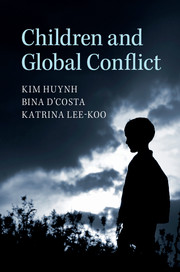Book contents
- Frontmatter
- Dedication
- Contents
- List of abbreviations
- Introduction: why children matter to global conflict
- 1 Children and armed conflict: mapping the terrain
- 2 Children and agency: caretakers, free-rangers and everyday life
- 3 Children and IR: creating spaces for children
- 4 The rights of the child: political history, practices and protection
- 5 Child soldiers: causes, solutions and cultures
- 6 Child forced migrants: bio-politics, autonomy and ambivalence
- 7 Children and peace building: propagating peace
- 8 Children and justice: past crimes, healing and the future
- 9 Who speaks for children? Advocacy, activism and resistance
- Conclusion
- Appendix
- Bibliography
- Index
2 - Children and agency: caretakers, free-rangers and everyday life
Published online by Cambridge University Press: 05 May 2015
- Frontmatter
- Dedication
- Contents
- List of abbreviations
- Introduction: why children matter to global conflict
- 1 Children and armed conflict: mapping the terrain
- 2 Children and agency: caretakers, free-rangers and everyday life
- 3 Children and IR: creating spaces for children
- 4 The rights of the child: political history, practices and protection
- 5 Child soldiers: causes, solutions and cultures
- 6 Child forced migrants: bio-politics, autonomy and ambivalence
- 7 Children and peace building: propagating peace
- 8 Children and justice: past crimes, healing and the future
- 9 Who speaks for children? Advocacy, activism and resistance
- Conclusion
- Appendix
- Bibliography
- Index
Summary
Introduction
‘I've been waiting ages to find out what's going on behind those piercing little eyes.’ You shrugged. ‘Snakes and snails and puppy dog tails.’
See? Kevin was (and remains) a mystery to me. You had that insouciant boy-thing going and blithely assumed that you had been there yourself and there was nothing to find out. And you and I may have differed on so profound a level as the nature of human character. You regarded a child as a partial creature, a simpler form of life, which evolved into the complexity of adulthood in open view. But from the instant he was laid on my breast I perceived Kevin Khatchadourian as pre-extant, with a vast, fluctuating interior life whose subtlety and intensity would if anything diminish with age. Most of all, he seemed hidden from me, while your experience was one of sunny, leisurely access.
This fictional dialogue between the parents of a juvenile murderer expresses two important perspectives relating to the issues of how much agency children have and how much power adults can exert over them. Kevin's father sees his son as delicate yet malleable. For him, the weakness of the child evokes the power and duty of care that comes with being grown up. This is an essentially sanguine perspective because the child's incompleteness embodies the family's – and indeed humanity's – boundless potential for replenishment and growth. Kevin's mother, on the other hand, sees her son as more capable of shaping himself and others than her husband would like to believe. For her, children are complex and perhaps even unknowable. She is thus inclined to maintain some distance from them. However, Kevin's profound inaccessibility undercuts his mother's authority and maternal instinct; she is unable to steer him away from the world's worst evils or prevent him from becoming one.
- Type
- Chapter
- Information
- Children and Global Conflict , pp. 35 - 64Publisher: Cambridge University PressPrint publication year: 2015
- 3
- Cited by

